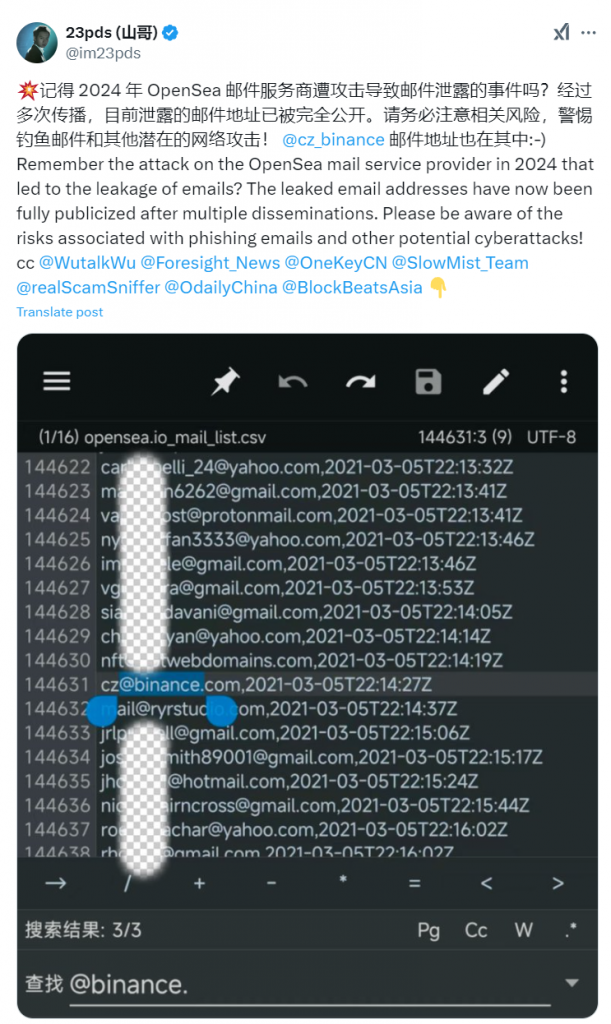The OpenSea Email Leak: A Year Later and It’s Now Fully Public
Back in June 2022, OpenSea — one of the world’s largest NFT marketplaces — suffered a data breach when an employee of its email automation provider, Customer.io, leaked millions of email addresses. While the breach was initially contained, the full scope of the damage has only recently come to light. Now, 7 million email addresses — many of which belong to high-profile individuals in the crypto and NFT spaces — have been fully exposed and are circulating freely online, creating a goldmine for phishing scams and other malicious activities.
The warning comes from SlowMist, a cybersecurity firm, and specifically from its Chief Information Security Officer, known by the handle 23pds. In a post shared on January 13, 23pds confirmed that the leaked data — originally kept under wraps — has now been widely disseminated, making it available to anyone with the knowledge to exploit it.
The Leaked Data: A Scammer’s Dream
The leak is not just a handful of random email addresses. According to 23pds, the exposed data includes high-profile figures from the world of cryptocurrency and NFTs, such as key opinion leaders (KOLs), well-known companies, and influencers. The revelation of this massive cache of information has left many wondering how many phishing attacks and scams might be right around the corner.
A screenshot shared by 23pds shows a Telegram message containing an attachment named “opensea.io_mail_list.rar”, which is said to contain the 7 million email entries. This leak is a direct result of an attack on OpenSea’s email service provider, Customer.io, in June 2022. At the time, OpenSea quickly issued a statement, warning users about the breach and confirming that if you had ever shared your email with the platform, you were likely impacted.

OpenSea’s Response and Fallout
OpenSea’s response to the breach back in 2022 was swift. They confirmed that an employee at Customer.io had leaked the emails, leading to the compromise of user data. OpenSea emphasized that they were cooperating with both the vendor and law enforcement to investigate the incident. They also urged users to remain vigilant, noting:
“If you have shared your email with OpenSea in the past, you should assume you were impacted.”
While OpenSea worked with Customer.io to handle the fallout, many users likely weren’t fully aware of the extent of the breach at the time. Now that the information is publicly available, the potential for phishing scams — where attackers use fake emails to steal personal information or funds — has skyrocketed.
Phishing Scams on the Rise
Phishing remains one of the most common and costly forms of cyberattack, especially in the crypto world. In 2024 alone, scammers were able to steal over $1 billion in digital assets, with 296 incidents reported, according to data from CertiK. As a result of the leaked emails, the likelihood of phishing attacks targeting OpenSea users has dramatically increased.
In fact, CertiK has warned that phishing was the most expensive attack vector in 2024, and many of these incidents go unreported, meaning the actual losses could be much higher. “Our figures are conservative,” said a CertiK spokesperson, adding that types of phishing scams like pig butchering (where scammers build fake relationships to steal funds) are also on the rise.
What Can You Do to Protect Yourself?
If you’re an OpenSea user and you think your email may have been part of the breach, there are some crucial steps you can take to protect yourself from scammers:
- Change Your Passwords: Ensure you’re using strong, unique passwords for every account. A password manager is essential to keep track of your credentials securely.
- Enable Two-Factor Authentication (2FA): Always use 2FA when possible, especially for your crypto wallets and NFT marketplace accounts. It’s best to use an authenticator app rather than relying on SMS-based 2FA, which can be more vulnerable to hacking.
- Stay Updated: Keep your devices and software up-to-date to avoid falling victim to known vulnerabilities.
The Bigger Picture: Privacy Concerns and Regulatory Scrutiny
The OpenSea email leak also raises larger questions about privacy and data security in the rapidly expanding world of Web3 and cryptocurrency. While the crypto space promotes decentralization and user sovereignty, incidents like this highlight the vulnerabilities of centralized platforms and third-party service providers. As more users embrace digital assets, the need for stronger protections against data breaches and scams is becoming more urgent.
In addition, regulatory authorities around the world are increasingly concerned about the handling of personal data in the crypto industry. With incidents like the OpenSea email leak gaining attention, regulators are likely to step up their scrutiny of how platforms protect user data, especially as phishing attacks continue to cost users millions of dollars.
Conclusion: Vigilance is Key
For now, the 7 million email addresses compromised in the OpenSea leak serve as a chilling reminder of the risks that come with digital platforms. While OpenSea took swift action to inform its users, the breach has opened the door for scammers and malicious actors to exploit the data. Users need to remain vigilant and take proactive steps to protect their accounts from the ever-growing threat of phishing.
As the crypto space continues to grow, so too does the sophistication of attacks aimed at its users. While the leak of OpenSea user emails is unfortunate, it also serves as a wake-up call for everyone in the Web3 world: security and privacy are paramount, and the responsibility to protect our digital identities lies with both users and the platforms we trust.



